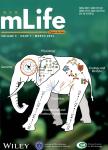The monkey microbial biobank brings previously uncultivated bioresources for nonhuman primate and human gut microbiomes
作者机构:State Key Laboratory of Microbial Resources and Environmental Microbiology Research Center at Institute of MicrobiologyChinese Academy of SciencesBeijingChina College of Life ScienceUniversity of Chinese Academy of SciencesBeijingChina State Key Laboratory of Microbial BiotechnologyShandong UniversityQingdaoChina China General Microorganism Culture CollectionInstitute of MicrobiologyChinese Academy of SciencesBeijingChina Microbial Resources and Big Data CenterInstitute of MicrobiologyChinese Academy of SciencesBeijingChina State Key Laboratory of NeuroscienceCAS Key Laboratory of Primate NeurobiologyCAS Center for Excellence in Brain Science and Intelligence TechnologyChinese Academy of SciencesInstitute of NeuroscienceShanghaiChina
出 版 物:《mLife》 (微生物(英文))
年 卷 期:2022年第1卷第2期
页 面:210-217页
学科分类:0710[理学-生物学] 07[理学] 071005[理学-微生物学]
基 金:financially supported by the National Key Research and Development Program of China(No.2019YFA0905601) the Strategic Priority Research Program of Chinese Academy of Sciences(Grant No.XDB38020300) China Microbiome Initiative(CMI)supported by Chinese Academy of Sciences(CAS-CMI).
摘 要:Impact statement Nonhuman primates(NHPs)such as monkeys are the closest living relatives to humans and are the best available models for causative studies of human health and diseases.Gut microbiomes are intensively involved in host health.In this study,by large-scale cultivation of microbes from fecal samples of monkeys,we obtained previously uncultured bacterial species and constructed a Macaca fascicularis Gut Microbial Biobank(MfGMB).The MfGMB consisted of 250 strains that represent 97 species of 63 genera,25 families,and 4 phyla.The information of the 250 strains and the genomes of 97 cultured species are publicly accessible.The MfGMB represented nearly 50% of core gut microbial compositions at the genus level and covered over 80% of the KO-based known gut microbiome functions of M.fascicularis.Data mining showed that the bacterial species in the MfGMB were prevalent not only in NHPs gut microbiomes but also in human gut microbiomes.This study will help the understanding and future investigations on how gut microbiomes interact with their mammalian hosts.



